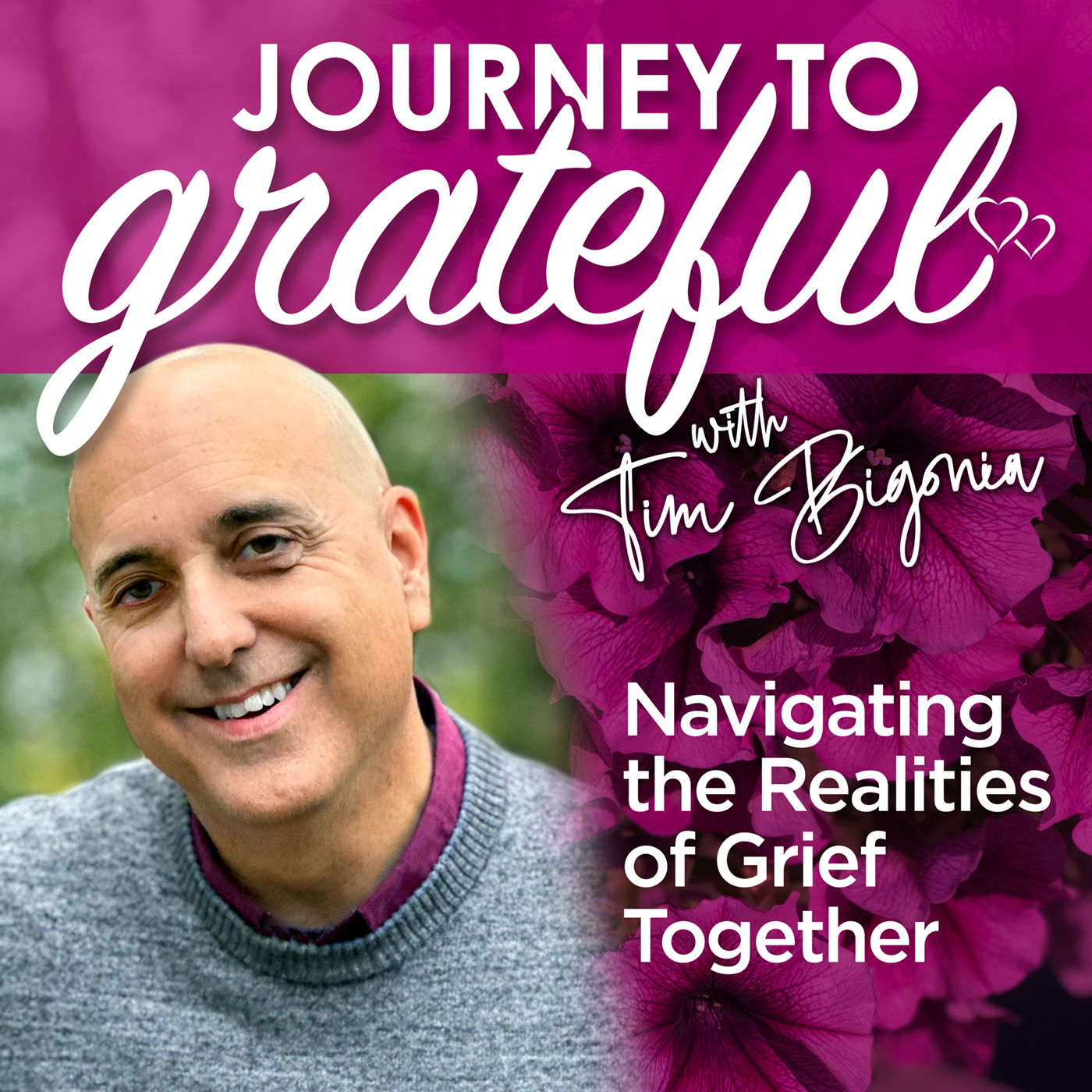SHARING OUR KNOWLEDGE
Sharing Our Stories and Experiences

Through my story and with the help of my contributors – friends, and family who have experienced loss in different ways – we will share our stories of loss and living through grief. Together as a community, we have chosen to speak our truth and share our experiences to help others navigate these daunting paths of loss. With knowledge and understanding, we hope to help bring you through your own Journey to Grateful.
WE NEED YOUR HELP
You can help grow our community and our podcast’s reach so more people dealing with loss can find this inspiring show. Please subscribe, listen, and rate & review the podcast, today.
Subscribe and Listen to Our Podcast
In this episode of Journey to Grateful, I explore the powerful truth behind “It’s okay not to be okay.” I'll share why embracing your messy, honest feelings is not only normal but essential to healing. I'll also provide a heartfelt invitation to let go of the need to “be strong” and find real strength in simply being real. Today you will discover that it is truly okay not to be okay.
When a parent dies, teens face a unique, often silent struggle — and the surviving parent is left to guide them while carrying their own grief. In this heartfelt episode, Tim explores how parents can support their teen’s grief journey with compassion and patience, while helping them move forward in a healthy, authentic way. Learn how to hold space for your teen’s emotions, encourage an ongoing connection with their lost parent, and remind them that simply being themselves is enough. If you’re navigating life after loss with your child, this conversation offers gentle guidance and hope.
We’re taught that men should be strong, stoic, and unbreakable — especially after losing a spouse. But real strength isn’t about hiding your pain; it’s about having the courage to feel it. In this episode, we explore what it means for men to show up fully in their grief, why vulnerability is a true sign of strength, and how embracing your emotions can help you build a new, more authentic life. Real men grieve — and it’s time we talk about it.
Grief isn’t just about missing the person you lost — it’s about mourning the entire world you shared with them. In this episode, we explore how loss touches every corner of your life: the routines, the imagined future, and the version of yourself that existed with them. By recognizing the full scope of what you’re grieving, you can better understand your pain and learn to be gentler with yourself as you navigate this new reality. Let’s unpack what it truly means to grieve beyond missing them.
Grief often feels heavy and isolating, but talking about it can bring unexpected healing and connection. In this episode, inspired by writer Liz Newman, we explore why sharing our grief matters, how it helps us honor those we’ve lost, and the power of being truly seen and heard. You’re not alone on this journey.
Grief often feels isolating, even in a room full of people. But letting ourselves be seen—truly seen—in our grief can unlock unexpected healing. In this episode, we explore the role of community in navigating loss: how to access support that actually helps, why vulnerability matters, and the quiet strength found in not walking this path alone.
In this episode of Journey to Grateful, I confront a question that’s echoed in the back of my mind more than I care to admit: What more can I say about grief? It’s not something others have asked — it’s a doubt that creeps in on its own. Join me as I explore why this question lingers, how past comments can still influence the way I carry my grief, and why I believe continuing the conversation is one of the most healing choices we can make.
In this episode, I reflect on the approaching five-year mark since my loss—a milestone that still feels both distant and incredibly close. This time of year brings back the painful memories of those final weeks, filled with difficult truths and quiet goodbyes. I’m not sharing this to seek sympathy, but to shed light on the full arc of grief—the way it stretches far beyond the moment of loss. Through personal reflection, I hope to offer insight into why grief lingers, why it changes us, and why understanding it—whether you’re grieving or supporting someone who is—is so important.
Before we experienced grief ourselves, many of us did our best to support others — but often in ways we now realize may have missed the mark. In this episode, I share an article that resonated deeply with me, exploring the regrets people have about how they once showed up for grieving friends and loved ones. As I reflect on a few of these powerful insights, we'll uncover how our own grief journeys can transform the way we support others with deeper empathy, compassion, and understanding.
Grief lessons often appear where we least expect them. In this episode of Journey to Grateful, I share an inspiring story that, at first glance, may not seem connected to grief at all. But look a little closer, and you'll see how it reflects the strength, hope, and perspective we discover along this path. This isn’t just about grief — it’s about how we live with it, grow through it, and carry it forward.


